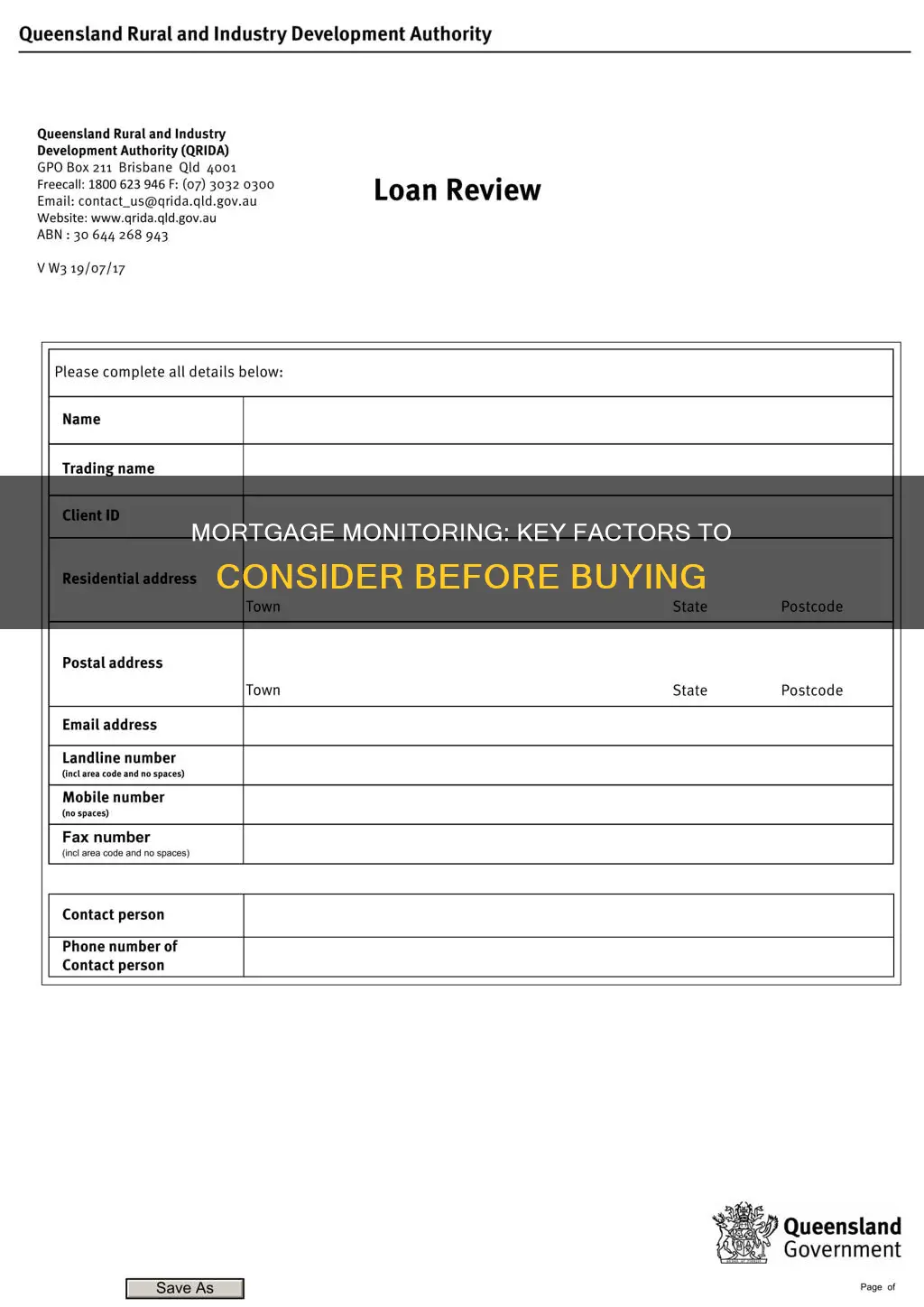
Buying a house is a significant financial decision, and it's essential to be well-prepared before taking the plunge. One crucial aspect to monitor when buying a mortgage is your credit score and credit report. Lenders will scrutinise these to assess your creditworthiness and determine the terms of your loan, including interest rates. A higher credit score indicates lower risk and can lead to more favourable loan conditions. Therefore, it's beneficial to monitor your credit score regularly and take steps to improve it, such as paying off existing debt and maintaining a consistent income. Additionally, keep an eye on your debt-to-income ratio, as lenders prefer borrowers with a lower ratio, indicating they have room in their budget for mortgage payments.
What You'll Learn

Credit score and credit report
Credit scores and credit reports are important factors in determining whether you will be approved for a mortgage and what interest rate you will be offered. A higher credit score suggests that you are capable of handling credit responsibly, while a lower score indicates that you may be a risky borrower.
In the US, mortgage lenders typically use classic FICO Scores, which range from 300 to 850. The minimum score for a conventional mortgage is around 620, though you may qualify for an FHA mortgage with a score as low as 500. A higher score makes it easier to qualify for a loan and may result in a better interest rate. As of March 2015, the median FICO score nationwide was 721, and the best rates went to borrowers with credit scores in the mid-700s or above.
Your credit score is based on several factors, including your payment history, the amount of money you owe, the length of your credit history, types of credit you've used, and your pursuit of new credit. It is calculated using a mathematical formula called a scoring model.
Credit reports keep a record of your account balances, total debt, age of your credit accounts, payment history, and other information. Lenders use these reports to help them decide if they will loan you money and at what interest rate. You can request a free credit report from each of the three major credit reporting companies (Equifax, Experian, and TransUnion) once per year. It is recommended to check your credit reports and scores as soon as possible if you are planning to buy a home, as the better your credit history, the more likely you are to receive a good interest rate on your mortgage loan.
Incorrect information on your credit report can occur due to errors made by credit bureaus, lenders, or debt collectors, or as a result of identity theft. Therefore, it is important to review your credit report carefully and dispute any inaccuracies. Checking your credit report will not hurt your credit score, and if you find outdated negative information, you can contact the credit reporting company to have it removed.
In addition to checking your credit report, you can also monitor your credit score through various means, some of which are free. However, it is important to pay attention to the fine print, as some companies use different scoring models than lenders.
Troubleshooting an ASUS Monitor Not Detecting HDMI on MacBook Pro
You may want to see also

Employment history and income
Lenders will want to see that you have a reliable source of income when applying for a mortgage. They will ask for proof of income and employment history, usually covering the last two years, to ensure that you can afford the mortgage payments.
Employment History
Lenders typically require a two-year work history to qualify for a home loan. They will want to see that you have been employed consistently for this period, although it doesn't necessarily need to be in the same job or even the same industry. For example, if you have been working as an accountant in the software industry and then move to a new job as an accountant in the medical field, this would be considered an acceptable career move by a lender. Gaps in your employment history may also be overlooked, especially if they are less than six months long and you can provide a valid reason for them, such as maternity leave, temporary disability, or studying.
If you are self-employed, a freelancer, or a contractor, you will need to provide additional documentation to prove your income, such as tax returns, 1099s from clients, and a profit and loss (P&L) statement.
Income
Lenders will also want to see that your income is high enough to cover the mortgage payments, and that it is stable and likely to continue for at least the next three years. They will calculate your debt-to-income (DTI) ratio by dividing your total monthly debt payments by your gross monthly income to determine how much of your income is going towards debt payments. A lower DTI is generally preferred by lenders as it shows that you will have room in your budget for a mortgage. For most mortgage options, you will need a DTI of 43% or less.
Lenders will also take into account your income sources when evaluating your eligibility for a mortgage. They will ask you to determine your gross monthly income, which can include salary from a job, money from side gigs or self-employment, alimony, child support, rental income, capital gains, investment income, and social security, among other sources.
Changing Jobs During the Mortgage Process
If you change jobs during the mortgage process, you should inform your lender immediately. They will want to see proof of your new income and employment details, such as an offer letter, a letter confirming any changes in job title, your most recent pay stub, and a verification of employment (VOE) letter. If you are relocating for the job, you will also need to provide a relocation letter from your employer.
Changing jobs during the mortgage process may affect your ability to qualify for a loan, especially if your income decreases substantially or you switch from a salaried position to a commission-based role. Lenders prefer to see consistency in your income and employment, as this gives them confidence in your ability to repay the loan.
Getting a Mortgage Without a Job
It is possible to get a mortgage without a job, but you will need to take additional steps to improve your chances of approval. You will need to document other consistent sources of income, such as alimony payments, child support, rental income, or liquid assets. You may also be able to qualify based on an offer letter for a new job or on your spouse's or partner's income and credit history.
Monitoring Bandwidth Usage: Firewall's Role and Importance
You may want to see also

Down payment and closing costs
When buying a home, you'll need to pay a down payment and closing costs. Here's what you need to know about these expenses:
Down Payment
The down payment is the portion of the home's purchase price that you pay upfront and out-of-pocket. The rest is financed through your mortgage loan. For example, if the home you're buying costs $250,000 and you're taking out a mortgage loan of $237,500, your down payment will be $12,500 (5%).
The minimum down payment amount depends on the type of loan you have:
- VA loan or USDA loan: 0% down payment
- FHA loan: 3.5% to 10% down payment, depending on your credit score
- Conventional loan: 3% to 20% down payment
If you're taking out a conventional loan with a down payment of less than 20%, you'll also need to pay for private mortgage insurance (PMI) until your loan reaches an 80% loan-to-value ratio (LTV).
It's recommended to have your down payment ready before starting to make offers on homes. You can save for a down payment through various ways, such as investments, savings accounts, or even gift money from relatives (with a gift letter provided to the lender).
Closing Costs
Closing costs refer to the fees and expenses associated with finalising your mortgage loan. These typically include attorney fees, appraisal fees, inspection fees, title search fees, loan origination fees, and more. Closing costs usually range from 2% to 6% of the loan amount, so for a $200,000 loan, you can expect to pay around $6,000 to $12,000 in closing costs.
You'll receive a Closing Disclosure document at least three business days before your closing day, detailing all the closing costs you owe. It's important to review this document carefully and ask questions about anything unclear.
Some costs that may be included in your closing costs are:
- Discount points: Optional fees you can pay upfront to lower your interest rate.
- Escrow fee: Paid to a third-party company that handles funds and facilitates the home sale.
- Home appraisal fee: Paid to a professional appraiser to determine the home's fair sale price or refinance value.
- Home inspection fee: Paid to a licensed inspector to assess the home's condition.
- Loan origination fee: Charged by the lender or broker for their services and to cover overhead costs.
- Title search fee and title insurance: Paid to check historical records for any liens against the property and to ensure it can be legally transferred to you.
- Recording fees: Paid to your county clerk's office to record the home sale in the public record.
- Real estate attorney fee: Paid for reviewing home sales contracts, which is required in some states.
In addition to the standard closing costs, there may be other fees depending on the type of mortgage you have. For example, if you have a VA loan, there may be a VA funding fee, while an FHA loan will typically include an upfront mortgage insurance premium (MIP) fee.
Adjusting Font Size on Your ASUS Monitor: A Simple Guide
You may want to see also

Location and property taxes
When buying a property, location is key. The physical location of the home influences the tax rate. Taxes help fund school districts, infrastructure, and public services, so property taxes are based on how much revenue is required to cover these services in a given area. When cities and counties require additional funds, your taxes may increase.
Property taxes are levied by your local municipality to pay for things like roads, schools, public transportation, parks, police, and firefighters. The amount varies from state to state, so be sure to investigate how property taxes are calculated in your specific locale. The more your property is worth, the more you will pay in taxes. Property taxes are calculated by multiplying the local tax rate by the property's assessed value. The assessed value is determined by a municipal assessor and is based on the home's size, recent sales in the area, the state of the local real estate market, and other factors.
When buying a home, you are typically required to pay property taxes in advance. In the United States, this usually means paying six months' worth of property tax upfront. After that, the schedule for paying taxes varies from monthly to annually, depending on where you live.
In addition to property taxes, there are other taxes you may need to pay when buying a home. These include transfer taxes, which are one-time fees upon the transfer of ownership, and mortgage registration taxes, which are based on the amount of debt secured by the real estate purchase.
Choosing the Right Cable for Your Monitor Setup
You may want to see also

Interest rate and loan type
Interest rates and loan types are key factors to consider when buying a mortgage. Here's what you need to monitor regarding these aspects:
Interest Rates:
Variable interest rates can significantly impact your monthly payments and the overall cost of your mortgage. It's important to understand how interest rates work and how they are determined. Lenders set interest rates based on various factors, including your credit score, income, debt, and the current market rates. A higher interest rate will result in higher monthly payments, while a lower interest rate can help you secure better loan terms. Monitor your credit score and financial situation to improve your chances of getting a lower interest rate.
There are two main types of interest rates:
- Fixed-rate: With this type of mortgage, the interest rate remains the same throughout the loan's term. This means your monthly payments will be consistent, making it easier to budget. Fixed-rate mortgages are usually fully paid off by the end of the set term, such as 15, 30, or 40 years. Shorter loan terms often require larger monthly payments but result in lower total interest costs over time.
- Adjustable-rate: Adjustable-rate mortgages (ARMs) have interest rates that can change periodically. The interest rate may be lower initially but can fluctuate, leading to potential increases in your monthly payments. Lenders usually set limits or caps on how much the interest rate can adjust and how often.
Loan Types:
Different types of mortgage loans are available, and each has its own eligibility requirements and interest rates. Here are some common loan types to consider:
- Conventional loan: This is a popular mortgage option that is not backed by the federal government. Most conventional loans are conforming loans, adhering to the limits set by the Federal Housing Finance Agency (FHFA).
- FHA loan: These loans are backed by the Federal Housing Administration and are considered less risky for lenders. As a result, they have less strict credit score requirements than conventional loans.
- VA loans: Offered by the U.S. Department of Veterans Affairs, these loans are available to qualifying service members, veterans, and their spouses. One of the most attractive features of VA loans is the absence of a down payment requirement.
- USDA loans: These government-backed loans assist individuals in buying homes in rural areas. USDA loans typically have a 0% down payment requirement, but specific eligibility criteria must be met regarding income and property location.
When deciding on a loan type, consider your financial situation, eligibility, and the level of risk you are comfortable with. Additionally, shop around and compare interest rates and loan terms from multiple lenders to make an informed decision.
Does Your Monitor Have FreeSync? Here's How to Tell
You may want to see also
Frequently asked questions
Knowing the status of your credit is the first step in preparing to apply for a home loan. Your credit score is an important factor that lenders consider when determining whether to extend you a home loan and what the interest rate and terms of your loan will be.
You can expect to qualify for common types of home loans with a credit score of 620. However, some lenders will still consider you eligible with a lower score if you exceed other criteria. It is possible to buy a house with a 600-credit score, but you’re more likely to get the terms and interest rates you want with a higher score.
Debt-to-income ratio (DTI) is another factor mortgage lenders assess when considering your loan application. Your DTI helps your lender see how much of your monthly income goes to debt payments so they can evaluate the amount of mortgage debt you can take on. A lower DTI is preferred by lenders because it shows that you have room in your budget for a new mortgage payment.
A mortgage preapproval is often the first step in securing a home loan. During this process, the lender assesses your financial health by reviewing your credit report, credit score, assets, income, debts, tax returns, employment history and personal information. Prequalification, on the other hand, is less rigorous and can help you understand your options. It normally doesn't require a credit check.
The origination fee is an upfront charge a mortgage lender may include to pay for certain costs related to your home loan. It could cover everything from preparing and underwriting the loan to processing your application.







